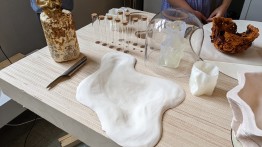Everything Will Be on the Table at This Year’s Tallinn Architecture Biennale
POSTED ON: August 10, 2022

Installation image of Everything’s On the Table by The Irwin School of Architecture's Hayley Eber and Mae-Ling Lokko. It is on view in the Tallinn Architecture Biennale co-curated by Assistant Professor Lydia Kallipoliti
An installation that reframes the dining table by students of The Irwin S. Chanin School of Architecture will be on view when the Tallinn Architecture Biennale (TAB) at the Estonian Museum of Architecture opens next month. Everything’s on the Table is the result of a Spring 2022 workshop class co-taught by Associate Dean Hayley Eber AR’01 and adjunct professor Mae-Ling Lokko based on a Fall 2021 seminar taught by Professor Lokko that explored design in the context of culinary practices. The work on view at TAB, the largest architectural festival in the Baltics, is part of a series exploring how metabolic processes related to food are linked to everyday domestic spaces and activities.
It is estimated that 40% of all material stock grown on the planet for food is lost between the farm and our homes. Of the food that makes it to our grocery shelves and plates, a significant amount is still discarded. Simply put, contemporary dining tables have become increasingly divorced from the broader production of food.
Everything’s on the Table’s 12-foot-long butcher block table installation aims to disrupt that system of waste by reimagining the table itself as a space for harvesting. It features physical culinary prototypes, such as a cast-iron cooking pan, grow-ware vases, cups, glasses, and more, developed by Cooper architecture students expanding on the seminar’s themes around nutrient recovery, farming, and cooking rituals on the table.
“Often, we overlook the role that household food practices have on wider scale food practices—from capturing and transforming a complex inventory of distributed food waste resources to support local economies," says Professor Lokko. “The household is a critical site for reinventing our relationship to food practices – from seed sharing to gardening and eating to composting. So, it was important for students explore the activation of new domestic rituals through design.”
And that’s not the only Cooper connection to the biennale as Lydia Kallipoliti, assistant professor of architecture, served as one of the co-curators. With the theme “Edible; Or, The Architecture of Metabolism,” the sixth TAB empowers architects, planners, and environmental designers to take a proactive stance on architecture’s expressive capacity to perform circular operations, to generate food and energy resources and to self-decompose. It runs September 7 through November 20, 2022.
The Irwin S. Chanin School of Architecture students:
Yunru Chen, Tilok Costa, Dov Diamond, Martina Duque Gonzalez, Foivos Geralis, Chia-Wei Hung, Yeji Kim, Pei-Ju Lin, Ahzin Nam, Frederick Rapp, Julia Penchaszadeh Robert, Tiam Schaper, Xinyi Xie, Shiman Xu, San Simeon




